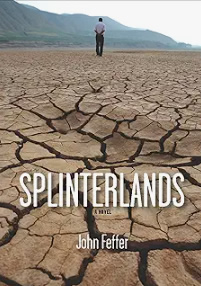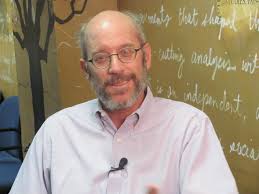So in Splinterlands, the very unusual novel by John Feffer, the world has fallen to tribalism. We’re not talking about Brexit or the dissolution of Yugoslavia; we’re talking about the Walloons of South Brussels at war with the Flemish of North Brussels and the Independent Nation of Vermont and New Hampshire. It is the war of all against all, and, yes, somebody’s making a profit. To paraphrase Lincoln Steffens, I have seen the future and it stinks.
 The novel takes the form of a report from Julian West, a famed geo-paleontologist and the author of the treatise, Splinterlands. Geo-paleontologists are those who study the disintegration of society; West claims to have invented the discipline but as we learn from a footnote (the novel is rife with footnotes) the term was actually first used by the Korean scholar Chung in-Moon in 2009. This is the future which has already begun.
The novel takes the form of a report from Julian West, a famed geo-paleontologist and the author of the treatise, Splinterlands. Geo-paleontologists are those who study the disintegration of society; West claims to have invented the discipline but as we learn from a footnote (the novel is rife with footnotes) the term was actually first used by the Korean scholar Chung in-Moon in 2009. This is the future which has already begun.
The central tenant of Splinterlands — the treatise, not the novel, is that periods of great human endeavor contain within them the seeds of human destruction. As humans advance, in science and technology, economically and politically, our demands increase, as does our sense of entitlement. And disappointments which no one would have cared about twenty years previous become important and powerful enough to crack society apart.
Thus: the internet has become the most significant communications development in human history, allowing unprecedented collaboration, scientific advancement, and dialogue, and also: fake news, the culmination (I hope) being some moron with a gun assaulting a pizza parlor, where a former Secretary of State was supposedly running a child sex ring.
Thus: advances in medicine have extended life-spans in First-World countries by an average of ten years. As a result of this and our failure to adjust, Social Security, Medicare and many private pension systems are underfunded and hurtling toward bankruptcy.
Thus: advances in political thinking have rendered totalitarian regimes like the Soviet Union or Kadaffi’s Libya untenable. Instead, we have smaller states that are either nakedly aggressive or weak and on the point of collapse.
You could probably think of a dozen other examples to support Dr. West’s thesis, but since Dr. West is a fictional character, let’s take a look at his life instead. An old man in the middle of the twenty-first centuries, he decides to visit each of his three children. Aurora is an academic, living in the remains of Brussels. Gordon is a fabulously successful arbitrage, living in the former China and using other people’s money to bet that the future will continue to be catastrophic. And Benjamin is a freelance freedom fighter, with no fixed address. For desert, West visits his ex-wife in a heavily-armed Vermont commune.
Splinterlands resembles other stories, but is unique. It resembles A Christmas Carol, with West as the ghost, as he makes these journeys not in his body but as an avatar, “present” to those around him but in fact lying in his bed back home. It resembles Nabokov’s Pale Fire, in that West uses the narrative to make himself look good (or at least thoughtful), but an unnamed editor uses footnotes to fill in the damning details. And, finally, it appears to invert Edward Bellamy’s Looking Backward, where a different Julian West travels far into the future (i.e., to 2000) to enjoy the benefits of a socialist utopia in America.

Splinterlands is a novel of ideas, but author John Feffer understands the need for fiction to have human engagement, conflict, threat, catharsis and resolution. The protagonist, Julian West is an engaging narrator, albeit a little pompous; part of the pleasure of reading the novel is to see his children and his ex deflate him; and what is left of his high-mindedness is relentlessly scoured by his footnote-casting editor. Although he exists only as a construct during his travels, the danger to him is real — most vividly, when he is caught in a crossfire between two rival terrorist groups, each supporting a different soccer club in the former Brussels.
This is a novel about the disintegration of civilization, and its consequences (for example: increased tribalism hindered cooperation on global warming, which resulted in Hurricane Donald, which wiped out Washington and forced the country to move the capital to Kansas City before the country disintegrated entirely). Nonetheless, there are winners as well as losers, as happens with every catastrophe; and Feffer describes the winners (primarily West’s son Gordon) with wit, even élan.
A geo-paleontologist might view a catastrophic disintegration of civilization as inevitable. But we read dystopian fiction like Splinterlands precisely because nothing is inevitable, to a people who have a will not to permit it to be. If you are one of those people, I recommend that you have a look at Splinterlands.
